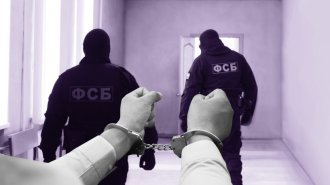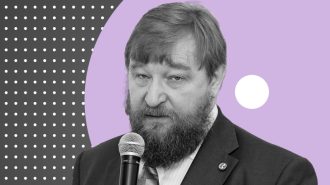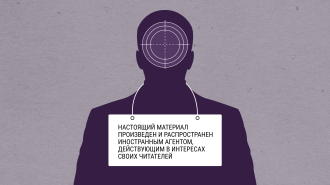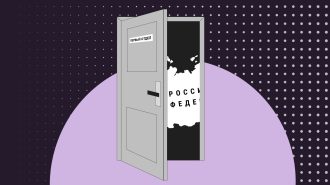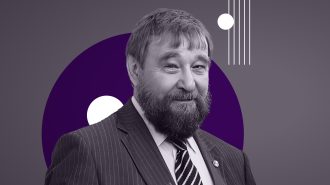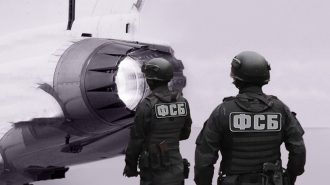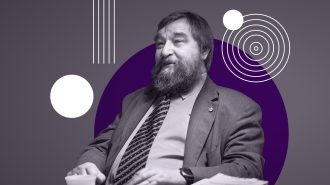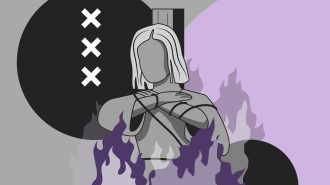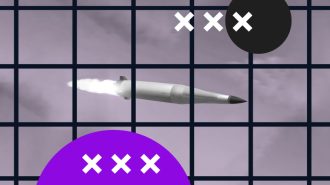In the spring of 2022, major publishers of scientific periodicals stopped collaborating with Russian organizations. In response, the Russian authorities initiated a “white list” of publications in which publication would be the basis for grant reporting. About 500 journals recently disappeared from the list - and returned with a recommendation to refrain from paying for open access in journals of the publishing house Elsevier, which announced that payments would be sent to support Ukraine. Scientists who do not follow this advice risk facing criminal charges article about treason.
Repression
Academicians turned to Vladimir Putin with a proposal to head a new body of the Russian Academy of Sciences - the Board of Trustees. But not everyone was able to vote for this decision. FSO employees blacklisted more than twenty scientists and did not allow them to attend the General Meeting of the Russian Academy of Sciences.
Censorship has actually returned to Russian book publishing, and the state’s special attention today is connected with LGBT issues. Some books are withdrawn from sale, others are removed from the school curriculum, and others are published with pages painted over. In an interview with T-invariant, cultural historian, candidate of philological sciences Mikhail Edelshtein explained what these measures are connected with, how the current situation differs from military censorship of the last century, and what role “offended graphomaniacs” play in all this.
In the third year after the start of Russia’s full-scale invasion of Ukraine, journalism faculties and media departments at all universities in the country changed their policies. the transfer of experience to novice journalists from military officers, Z-bloggers and even former prisoners has become regular and widespread.
In Novosibirsk, they are considering the criminal case of corresponding member of the Russian Academy of Sciences Oleg Kabov, which was initiated by the FSB. This is the first case in Russia when a scientist is being tried for his allegedly unsatisfactory work, and scientific and technical expertise forms the basic part of the charge. The very fact that you can go to prison for poorly conducted research is a new page both in the history of Russian science and in the history of domestic jurisprudence. Kabov's case is a challenge to the entire scientific community. It will show whether science in Russia can defend its right to exist.
The FSB completed investigative actions in the case of corresponding member of the Russian Academy of Sciences Sergei Abramov a year later: the materials were transferred to the court, which must set a date for the hearing. According to T-invariant, Abramov’s case involves seven donations of 1,000 rubles each. The scientist himself has repeatedly denied his guilt, including denying that he made these translations.
According to the Ministry of Justice, “the T-invariant project opposed the special military operation in Ukraine and carried out public actions aimed at creating a negative image of the Armed Forces of the Russian Federation.”
T-invariant opens a series of publications related to the second anniversary of the war with Ukraine. In the first investigation, we tell how the FSB of the Russian Federation launched the largest “case of scientists” in modern Russia, pursuing the signatories of an anti-war letter throughout the country.
On February 16, 2024, came the terrible news — Alexei Navalny was killed. His death has become a personal tragedy for millions of people. Putin's regime has shown that it will stop at no crime in pursuit of its goals.
In 2023, the FSB began subjecting dissenters to punitive psychiatry. Corresponding Member of the Russian Academy of Sciences Sergei Abramov left the psychiatric hospital after the examination and became familiar with the updated version of the charges. T-invariant spoke with the scientist about his life with the “extremist” label, his political views and the reasons for the security forces’ attack on the Russian supercomputer industry.
New detainees in the case of Siberian scientists from the Institute of Theoretical and Applied Mechanics (ITPM) named after. Christianovich of the Siberian Branch of the Russian Academy of Sciences, accused of treason, was scientist Vladislav Galkin from Tomsk. The human rights organization First Department is confident that the repressive campaign is growing and the next victim of the FSB could be absolutely any scientist who has worked on this topic as part of international collaborations.
The Russian Federation's leading specialist in supercomputer systems was first checked by the FSB “for treason”, then kept under house arrest for six months on suspicion of “financing an extremist organization”. After fruitless attempts to plant according to the proven Soviet tradition, the “fool” is used. Sergei Abramov, corresponding member of the Russian Academy of Sciences, founder of a number of innovative companies, is planned to be sent to a psychiatric hospital for three weeks on November 30 for “conducting an inpatient examination.”Because the outpatient motivation of the scientist who organizes the supercomputer forum in Pereslavl-Zalessky, even while under investigation, the FSB could not understand even after eight months.
In Ivanovo, under strange circumstances, Olga Nazarenko, associate professor of the department of pharmacology of the Ivanovo State Medical Academy and political activist, died from numerous injuries. The lawyer was unable to get an investigation into the causes of her death and gain access to a medical report on the causes of death, so she is going conduct your own investigation. T-invariant spoke with the lawyer of the deceased and some other local activists who knew Olga personally and mourn her death.
Sergey Abramov, corresponding member of the Russian Academy of Sciences, has been under house arrest for two months now. He is accused of "financing an extremist organization." Details of the criminal case remain unpublished, but T-Invariant found out that Abramov had previously been investigated under the article of law on "state treason," and the scientist had a security clearance for state secrets.
Three physicists were arrested in so called "Novosibirsk case". It wasn’t the first time. Previously, four scientists were also accused of treason in different years. All of the scientists accused in all these cases participated in the projects of the seventh framework program of the European Union "TransHyBerian" (coordinator — Von Karman Institute of Hydrodynamics, Belgium). However, the interlocutors and sources of T-invariant suggest that the contacts of scientists with China and Iran are only an excuse, not the reason for the arrests.






